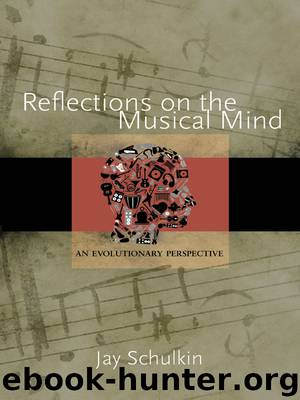Reflections on the Musical Mind by Schulkin Jay Gjerdingen Robert O

Author:Schulkin, Jay, Gjerdingen, Robert O.
Language: eng
Format: epub
Publisher: Princeton University Press
Published: 2013-02-01T16:00:00+00:00
Figure 6.1 (a) Attentional responses are greater in neonates to consonant melodies versus dissonant melodies. (b) Fewer motor actions to consonant melodies versus dissonant melodies.
Source: Zentner and Kagan 1996.
Early training can enhance perception of musical sensibility.10 An intuitive sensibility for music is just another way to express the fact that the musical systems are core, easily expressed and effortless, although culturally varied, requiring formal and informal training as part of the socialization process amidst the perception of consonance (figure 6.1).11 Temperament is also a feature in all factors of the human condition, including that of music, as is the lateralization of neural expression with regard to emotional appraisals of music.12
The brain is prepared to respond to music (table 6.1). Infants are indeed, in some contexts, able to tune into rhythm more easily than adults, as specialized development in the brain for musical processing begins in the first few days of the neonate’s life.13 Diverse common processing is expressed in musical sequencing.14 A musical/auditory syntactical template underlies the cephalic capability in the child to engage music early and effortlessly. What varies is the cultural milieu and the individual talent. Like the heart, music is a core feature of humans. Song is a universal trait tied to diverse emotions in which classification schemata and measurement are paramount.15
An understanding of musical experiences demands different levels of analysis including genetic, neural, cognitive/behavioral, and cultural. Interestingly, amusics (individuals that are unable to carry a tune) and their first cousins often have the same impairments in the perception of pitch.16
Musical sensibility can be spared in developmental disorders, although not always.17 Learning disabilities have been noted for music itself. Indeed, forms of devolution of function decrease the competence to integrate music into motor expression with tone and melody.18 This occurs because pervasive links between diverse appraisal systems permeate music, not because one is cognitive and the other is not.
Maurice Ravel, the composer of Bolero, is reported to have developed aphasia after a blow to the head.19 While he apparently felt he could hear his music in his mind, he was unable to write it down. However, other conductors who have developed aphasia and even motor apraxia have had their musical ability spared.20 Extreme musical devolution such as Ravel’s is rare.21
Some individuals, however, appear to be amusical; disorders of musical perception are clearly demonstrable.22 One example is impaired detection of pitch, or tone-deafness.23 We do not know much about the possible genes that underlie amusicality, but we do know that diverse levels of analysis underlie any explanation of those with ability for music as well as those without any talent.
TABLE 6.1
Early Exposure to Musical Developing and Training
Passive experience
Active experience
Early developing universal constraints
Download
This site does not store any files on its server. We only index and link to content provided by other sites. Please contact the content providers to delete copyright contents if any and email us, we'll remove relevant links or contents immediately.
The Art of Thinking Clearly by Rolf Dobelli(10376)
Mindhunter: Inside the FBI's Elite Serial Crime Unit by John E. Douglas & Mark Olshaker(9283)
Change Your Questions, Change Your Life by Marilee Adams(7715)
Nudge - Improving Decisions about Health, Wealth, and Happiness by Thaler Sunstein(7676)
Mastermind: How to Think Like Sherlock Holmes by Maria Konnikova(7303)
The Power of Now: A Guide to Spiritual Enlightenment by Eckhart Tolle(5719)
Men In Love by Nancy Friday(5217)
Altered Sensations by David Pantalony(5085)
Factfulness: Ten Reasons We're Wrong About the World – and Why Things Are Better Than You Think by Hans Rosling(4723)
The Confidence Code by Katty Kay(4233)
Thinking in Bets by Annie Duke(4199)
Man and His Symbols by Carl Gustav Jung(4113)
The Worm at the Core by Sheldon Solomon(3467)
Why Buddhism is True by Robert Wright(3434)
Liar's Poker by Michael Lewis(3429)
Three Women by Lisa Taddeo(3407)
The Inner Life of Animals by Peter Wohlleben(3293)
Descartes' Error by Antonio Damasio(3261)
How Music Works by David Byrne(3245)
